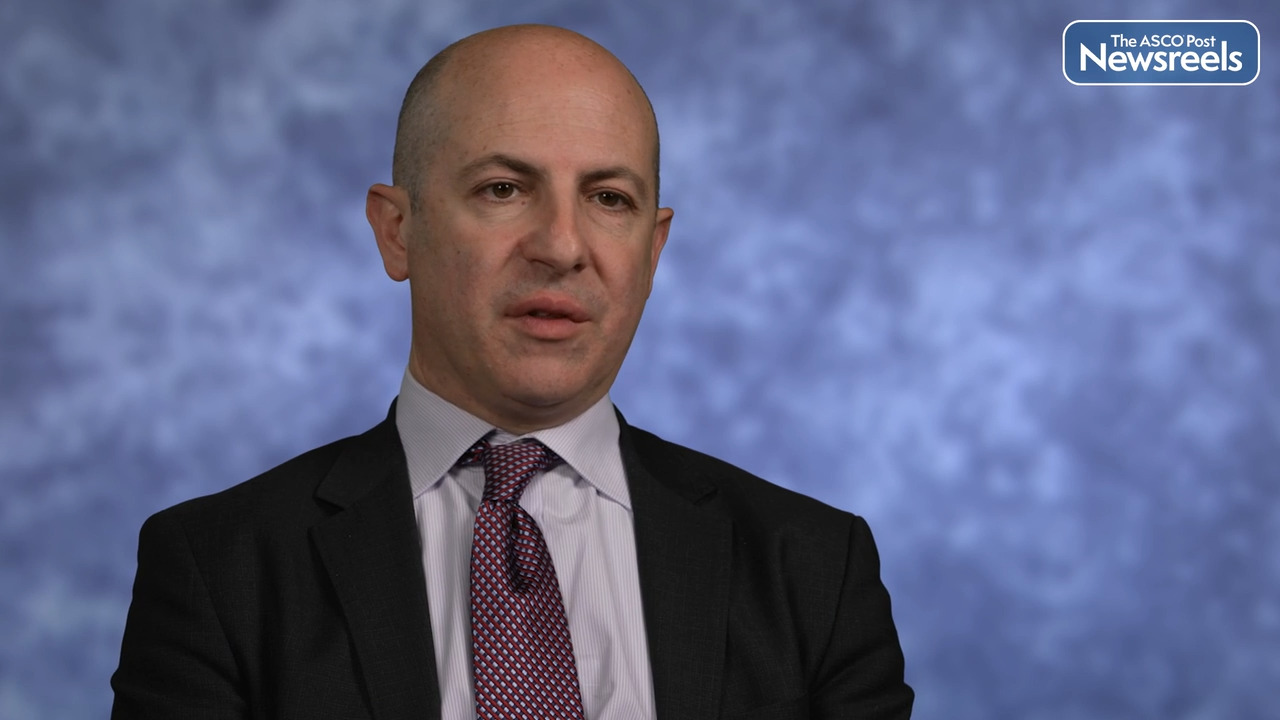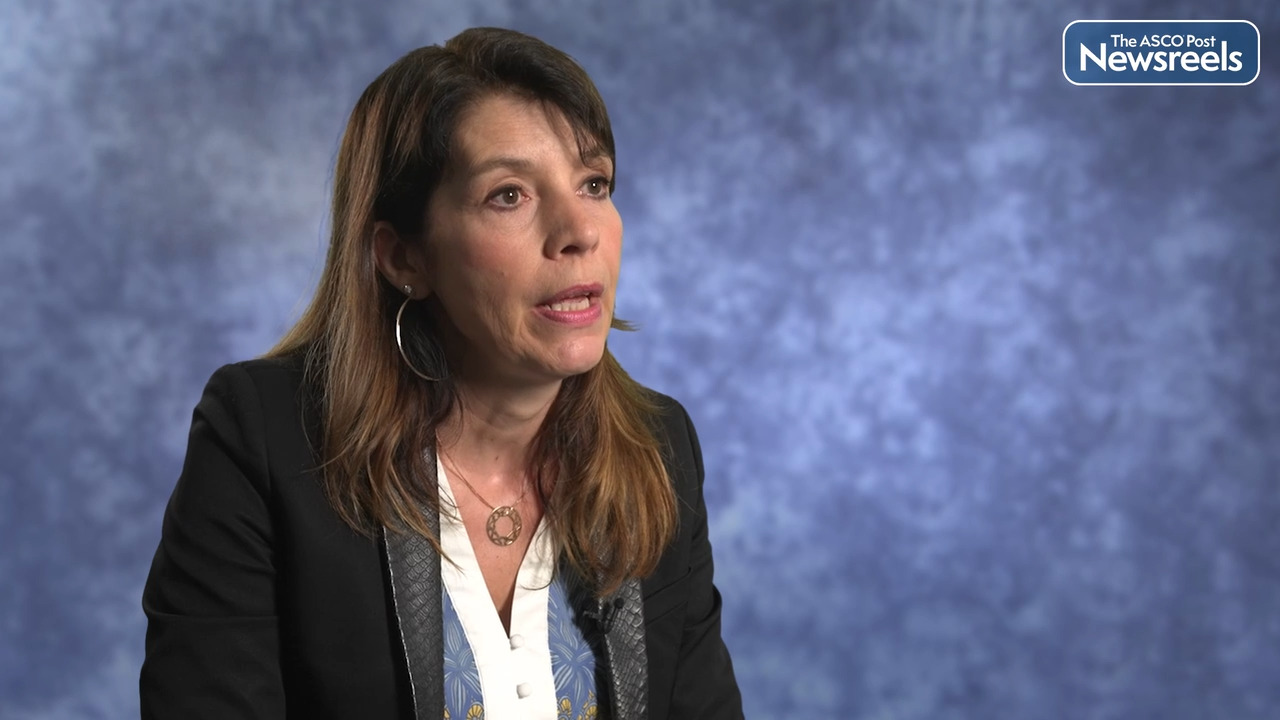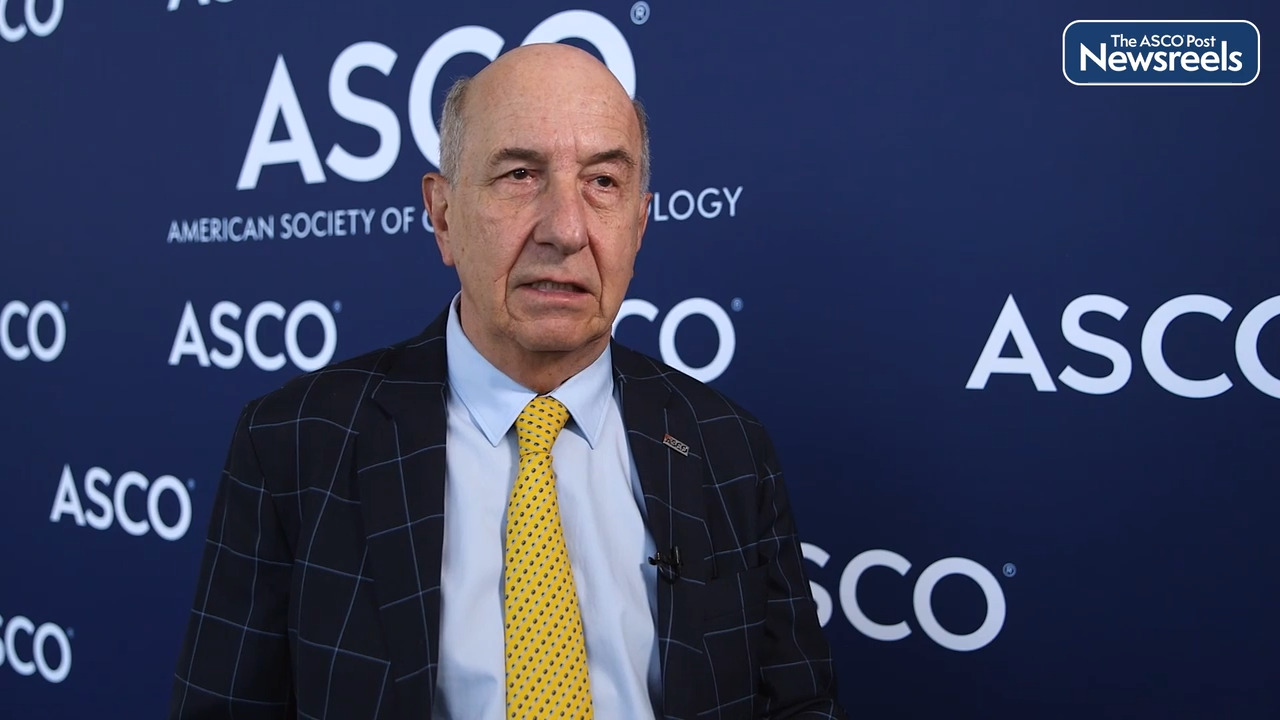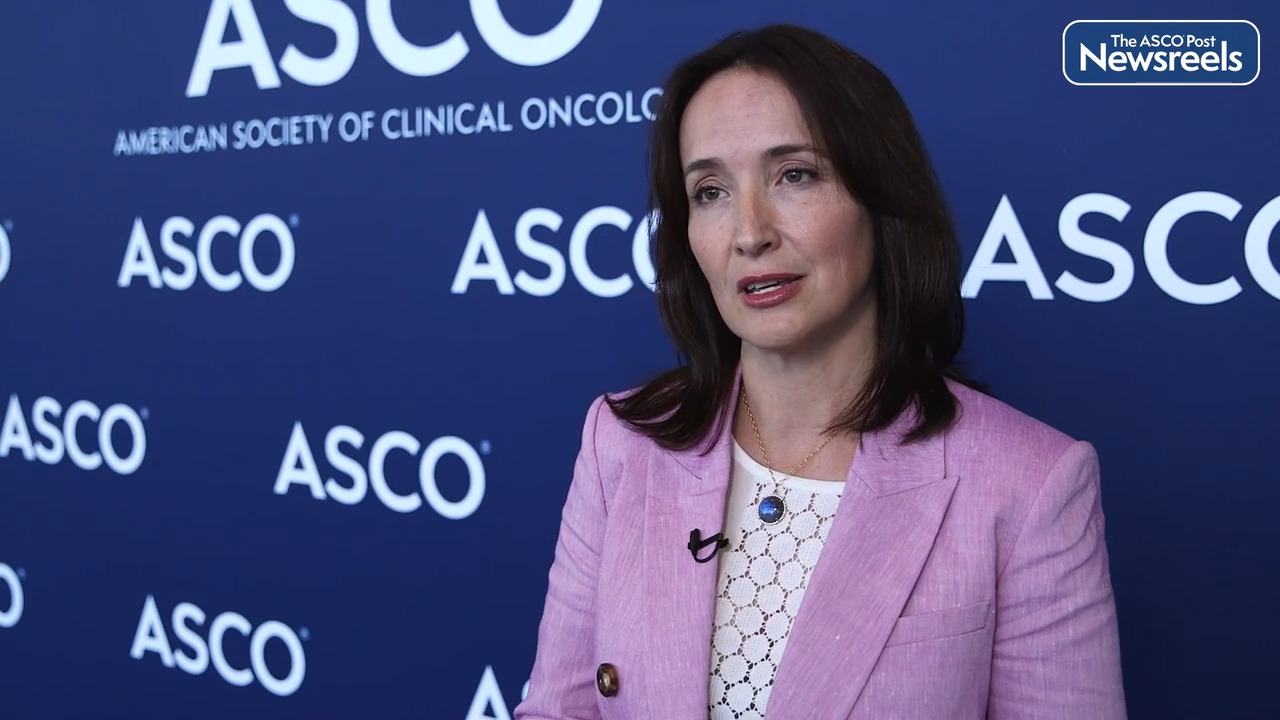Neoadjuvant and Adjuvant GVAX Plus Nivolumab and Urelemab May Increase Immune Response in Patients With Resectable Pancreatic Cancer
A combination of the pancreatic cancer vaccine GVAX, the immune checkpoint inhibitor nivolumab, and the anti-CD137 agonist antibody urelemab may be safe and increase the amount of immune T cells in the tumors of patients with operable pancreatic cancer when given 2 weeks prior to surgical tumor...
Staging Laparoscopy May Help Identify Early Metastases in Patients With Pancreatic Cancer
Performing a minimally invasive staging laparoscopy on patients with newly diagnosed pancreatic cancer may help determine the stage and identify cancer metastases early, according to a novel study published by Gudmundsdottir et al in the Journal of the American College of Surgeons. The new findings ...
Patients Whose Pancreatic Cysts Remain Stable for 5 Years May Have Decreased Risk of Pancreatic Cancer
Investigators have called into question the health benefit of extended surveillance for patients whose pancreatic cysts have not changed size for at least 5 years and had no worrisome features, according to a new study published by Chhoda et al in Clinical Gastroenterology and Hepatology....
DIPLOMA Trial: Minimally Invasive Distal Pancreatectomy Noninferior to Open Surgery for Early-Stage Pancreatic Cancer
For patients with fully resectable pancreatic cancer, a minimally invasive surgical approach—laparoscopic or robotic—was shown to be comparable to open distal pancreatectomy in the multicenter randomized phase III DIPLOMA trial. These results were presented at the 2023 ASCO Annual Meeting and at a...
Early Detection of Pancreatic Cancer Saved My Life
When my sister was diagnosed with breast cancer 25 years ago, her medical team suggested we undergo genetic testing for the BRCA gene mutation. I knew that being a BRCA carrier put me at greater risk for breast and ovarian cancers, but I had no idea it also increased my risk for pancreatic cancer....
Minimally Invasive Distal Pancreatectomy in Patients With Resectable Pancreatic Cancer
Results from the international, randomized DIPLOMA trial (ClinicalTrials.gov identifier NCT04483726) comparing minimally invasive distal pancreatectomy (MIDP) with open distal pancreatectomy (ODP) in patients with pancreatic ductal adenocarcinoma showed that the rate of radical resection following...
Elena Garralda, MD, MSc, Discusses Findings From the KRYSTAL-1 Trial
Elena Garralda, MD, MSc, Director of Early Drug Development at Vall d’Hebron University Hospital and Director of the Phase I Unit at NEXT Oncology, Barcelona, was invited to discuss the KRYSTAL-1 findings. “In KRYSTAL-1, adagrasib monotherapy has demonstrated clinically meaningful activity in a...
KRYSTAL-1 Update: Adagrasib Yields Benefit in Variety of KRAS G12C–Mutated Tumors
In the phase I/II KRYSTAL-1 trial, the KRAS inhibitor adagrasib demonstrated clinical activity in previously treated patients with pancreatic ductal adenocarcinoma, biliary tract cancer, and other solid tumors harboring KRAS G12C mutations, according to research presented at the ASCO Plenary Series ...
Risk of Early-Onset Digestive Tract Cancers Among Young Adults With Nonalcoholic Fatty Liver Disease
In a Korean nationwide cohort study reported in the Journal of Clinical Oncology, Park et al found that individuals aged 20 to 39 years with nonalcoholic fatty liver disease (NAFLD) were at an increased risk of developing early-onset digestive tract cancers. Study Details The study included data on ...
I’m BRCA-Positive and Survived Both Breast and Pancreatic Cancers
Cancer has stalked my family for generations. My mother, brother, and maternal uncle were diagnosed with melanoma. Fortunately, all survived. When my sister was diagnosed with early-stage invasive ductal carcinoma in 2010, she underwent genetic testing, which showed she was positive for the BRCA2...
Study Finds Precursor Pancreatic Lesions Occur Frequently in Healthy Human Pancreases
Pancreatic cancer is a rare disease, accounting for about 3% of all cancers in the United States. It is the deadliest of all solid malignancies, accounting for about 7% of all cancer deaths each year, and carries a 5-year survival rate of just 11.5%. According to the American Cancer Society, in...
Antibiotic Use and Survival Among Patients With Metastatic Pancreatic Cancer Receiving Specific Chemotherapy Regimens
In a retrospective cohort study reported in JAMA Network Open, Fulop et al found that perichemotherapy use of antibiotics was associated with improved survival in patients with metastatic pancreatic ductal adenocarcinoma receiving first-line gemcitabine-based chemotherapy, but not in those...
Chemotherapy May Alter Immune Cell Landscape in Patients With Pancreatic Cancer
Chemotherapy may affect the immune system’s ability to attack tumors in patients with pancreatic ductal adenocarcinoma, according to a new study published by Werba et al in Nature Communications. Background Pancreatic ductal adenocarcinoma is hard to detect and treat, with a 5-year survival rate of ...
Hospital Surgical Volume May Impact Survival in Patients With Pancreatic Cancer Whose Minimally Invasive Surgery Is Converted to an Open Procedure
Patients with pancreatic ductal adenocarcinoma whose pancreatoduodenectomy is converted to an open (CTO) procedure from a minimally invasive procedure as a result of complications may fare better at institutions that perform more minimally invasive pancreatic cancer surgeries annually, according to ...
Expert Point of View: Laura Goff, MD, MSCI
Invited discussant Laura Goff, MD, MSCI, Associate Professor of Medicine and Executive Medical Director for the Cancer Patient Care Center at Vanderbilt-Ingram Cancer Center, Nashville, said that with the results of NAPOLI-3, clinicians have a third effective first-line regimen for metastatic...
First-Line NALIRIFOX Improves Survival in Metastatic Pancreatic Cancer
In the phase III NAPOLI-3 trial in previously untreated patients with metastatic pancreatic cancer, the NALIRIFOX regimen significantly improved overall survival and progression-free survival over nab-paclitaxel plus gemcitabine.1 NALIRIFOX, which contains liposomal irinotecan, fluorouracil,...
Outcomes After Minimally Invasive vs Open Surgery for Pancreatic Adenocarcinoma
In a Belgian single-institution retrospective study reported in JAMA Network Open, Topal et al found that minimally invasive pancreatic surgery (MIPS) was associated with better overall survival and disease-free survival vs open pancreatic surgery (OPS) for borderline resectable or resectable...
Pancreatic Cancer Rates May Be Rising Faster Among Younger Women Than Younger Men
Investigators have confirmed that rates of pancreatic cancer are rising overall, but they are rising faster among younger female patients—particularly among patients who identified as Black—than among male patients of the same age, according to a new study published by Abboud et al in...
Second-Line Bevacizumab Plus FOLFIRI for Advanced Gastroenteropancreatic Neuroendocrine Carcinoma
In a French noncomparative phase II trial (PRODIGE 41-BEVANEC) reported in The Lancet Oncology, Walter et al found that the addition of bevacizumab to FOLFIRI (irinotecan, leucovorin, and fluorouracil) did not appear to improve overall survival in the second-line treatment of patients with advanced ...
Zev A. Wainberg, MD, on Pancreatic Ductal Adenocarcinoma: Recent Findings on NALIRIFOX vs Nab-paclitaxel Plus Gemcitabine
Zev A. Wainberg, MD, of the UCLA School of Medicine, discusses phase III findings from the NAPOLI-3 trial, which showed that first-line NALIRIFOX (liposomal irinotecan plus fluorouracil/leucovorin plus oxaliplatin) improved overall and progression-free survival compared with nab-paclitaxel plus gemcitabine in treatment-naive patients with metastatic pancreatic ductal adenocarcinoma. The safety profile of NALIRIFOX was manageable and consistent with the profiles of each agent (Abstract LBA661).
NAPOLI-3: First-Line NALIRIFOX Regimen Improves Overall Survival in Metastatic Pancreatic Cancer
In the phase III NAPOLI-3 trial in previously untreated patients with metastatic pancreatic cancer, the NALIRIFOX regimen significantly improved overall survival and progression-free survival over nab-paclitaxel plus gemcitabine. NALIRIFOX contains liposomal irinotecan, fluorouracil, leucovorin,...
Sotorasib in Previously Treated Patients With KRAS G12C–Mutated Advanced Pancreatic Cancer
In the phase I/II CodeBreaK 100 trial reported in The New England Journal of Medicine, John H. Strickler, MD, and colleagues found that the KRAS G12C inhibitor sotorasib showed activity in previously treated patients with advanced pancreatic cancer and a KRAS G12C mutation. Study Details In the...
Effect of Adjuvant Chemotherapy on Survival in Patients With Resected Pancreatic Adenocarcinoma After Multiagent Neoadjuvant Chemotherapy
In a retrospective matched-cohort study reported in JAMA Oncology, Sugawara et al found that receipt of adjuvant chemotherapy improved survival vs no adjuvant chemotherapy in patients with pancreatic adenocarcinoma who received curative-intent surgery following multiagent neoadjuvant chemotherapy....
Addition of Adjuvant Nab-paclitaxel to Gemcitabine in Pancreatic Ductal Adenocarcinoma
As reported in the Journal of Clinical Oncology by Margaret A. Tempero, MD, and colleagues, the phase III APACT trial has shown no improvement in independently assessed disease-free survival (the study’s primary endpoint) with the addition of adjuvant nab-paclitaxel to gemcitabine in...
Triple Immunotherapy Combination Studied Preclinically for Pancreatic Cancer
Researchers at The University of Texas MD Anderson Cancer Center have discovered a novel immunotherapy combination, targeting checkpoints in both T cells and myeloid suppressor cells, that successfully reprogrammed the tumor immune microenvironment and significantly improved antitumor responses in...
Sotorasib Shows Clinically Meaningful Activity Among Patients With KRAS G12C–Mutated Advanced Pancreatic Cancer
The KRAS G12C inhibitor sotorasib demonstrated clinically meaningful anticancer activity with an acceptable safety profile in heavily pretreated patients with KRAS G12C–mutated metastatic pancreatic cancer, accordi�ng to a novel study published by Strickler et al in The New England Journal of...
Impact of Adjuvant Therapy on Outcomes in Patients With Node-Negative Disease After Neoadjuvant Therapy and Resection of Pancreatic Carcinoma
In a retrospective cohort study reported in JAMA Surgery, Hammad et al found that adjuvant therapy was associated with better outcomes vs no adjuvant therapy in patients with node-negative disease after neoadjuvant therapy and resection of pancreatic carcinoma. Study Details The study used data...
How the Pancreatic Cancer Early Detection Consortium Aims to Advance Survival Rates in This Deadly Disease
The statistics are grim: Worldwide, pancreatic cancer is the 12th most common cancer and the seventh leading cause of cancer mortality.1 In the United States, the malignancy has the highest mortality rate of all major cancers. It is currently the third leading cause of cancer-related death after...
2022 Annual Report to the Nation on the Status of Cancer Released
Overall cancer death rates continued to decline among men, women, children, adolescents, and young adults in every major racial and ethnic group in the United States from 2015 to 2019, according to the latest Annual Report to the Nation on the Status of Cancer. From 2014 to 2018, overall cancer...
Researchers Find Possible Link Between Immune Cells’ Closest Neighbors and Survival Time in Patients With Pancreatic Cancer
Researchers have discovered that the organization of different types of immune cells within pancreatic tumors may be associated with how well patients with pancreatic cancer respond to treatment, as well as how long they survive. This information could eventually lead to new ways of treating...
Polycystic Ovary Syndrome and Risk of Pancreatic Cancer
In a single-center case-control study reported as a research letter in JAMA Oncology, Peeri et al found that women with polycystic ovary syndrome (PCOS) may be at an increased risk of developing pancreatic cancer. Study Details The study involved data from the Memorial Sloan Kettering Cancer Center ...
Study Analyzes Postimaging Diagnoses of Pancreatic Cancer
Computed tomography (CT) and magnetic resonance imaging (MRI) scans may miss the detection of some pancreatic cancer tumors, narrowing the window for life-saving curative surgery, according to new research presented at the United European Gastroenterology (UEG) Week 2022 (Abstract OP192). The...
Preclinical Study Finds New Synthetic Lethal Agent Could Be Potential Treatment for Pancreatic Cancer
Researchers at The Marvin and Concetta Greenberg Pancreatic Cancer Institute at Fox Chase Cancer Center have found that a new synthetic lethal agent could be an effective treatment for pancreatic cancers with DNA damage repair (DDR) defects. Igor Astsaturov, MD, PhD, a co-director of the Institute...
5-Year Outcomes With Adjuvant mFOLFIRINOX vs Gemcitabine in Pancreatic Cancer
As reported in JAMA Oncology by Thierry Conroy, MD, and colleagues, 5-year analysis of the phase III PRODIGE 24/Canadian Cancer Trials Group PA6 trial has shown a significant benefit in overall survival and other outcomes with adjuvant mFOLFIRINOX (modified oxaliplatin, irinotecan, leucovorin, and...
Christelle de la Fouchardiere, MD, on Pancreatic Ductal Adenocarcinoma: Phase III Trial Results With Gemcitabine Plus Paclitaxel
Christelle de la Fouchardiere, MD, of France’s Centre Léon Bérard, discusses phase III findings from the PRODIGE 65–UCGI 36–GEMPAX UNICANCER study, which evaluated whether the combination of gemcitabine and paclitaxel improves overall survival compared with gemcitabine alone in patients with metastatic pancreatic ductal adenocarcinoma after FOLFIRINOX failure or intolerance (Abstract LBA60).
Sequencing Therapies May Improve Overall Survival in Metastatic Pancreatic Cancer
In the first-line treatment of metastatic pancreatic cancer, the sequencing of nab-paclitaxel plus gemcitabine with FOLFOX (fluorouracil, leucovorin, oxaliplatin) resulted in a significant improvement in overall survival at 12 months and in all other efficacy endpoints as compared with the standard ...
Maintenance Olaparib vs Placebo in Germline BRCA-Mutated Metastatic Pancreatic Cancer: Overall Survival Analysis of the POLO Trial
As reported in the Journal of Clinical Oncology by Hedy L. Kindler, MD, FASCO, and colleagues, the final overall survival analysis of the phase III POLO trial showed no significant difference between the maintenance olaparib group vs the placebo group in patients with germline BRCA-mutated...
Neoadjuvant mFOLFIRINOX With or Without Radiotherapy for Borderline Resectable Pancreatic Cancer
As reported in JAMA Oncology by Matthew H.G. Katz, MD, and colleagues, the National Clinical Trials Network phase II A021501 trial has shown better survival outcomes with neoadjuvant modified FOLFIRINOX (mFOLFIRINOX; oxaliplatin, irinotecan, leucovorin, fluorouracil) vs mFOLFIRINOX plus...
Adherence to VTE Prophylaxis Guidelines After Pancreatic Cancer Surgery
In a U.S. retrospective cohort study reported in JAMA Surgery, Perry et al found that a very small percentage of patients filled prescriptions for guideline-recommended venous thromboembolism (VTE) prophylaxis after undergoing surgery for pancreatic cancer. As stated by the investigators, “VTE is...
Noncytotoxic Maintenance With Niraparib Plus Either Nivolumab or Ipilimumab in Platinum-Sensitive Advanced Pancreatic Cancer
In a single-institution phase Ib/II trial reported in The Lancet Oncology, Kim A. Reiss, MD, and colleagues found that maintenance treatment with niraparib/ipilimumab produced better 6-month progression-free survival rates than niraparib/nivolumab in patients with advanced pancreatic cancer without ...
Outcomes in Pancreatic Cancer Surveillance Program for Carriers of Germline CDKN2A Pathogenic Variants
In a Dutch study reported in the Journal of Clinical Oncology, Klatte et al provided findings from a 20-year follow-up of a pancreatic cancer surveillance program including carriers of germline CDKN2A pathogenic variants. Study Details The study included 347 carriers in the Netherlands who...
Outcomes of Pancreas Surveillance in the CAPS5 Study and Total CAPS Cohort
As reported in the Journal of Clinical Oncology by Dbouk et al, in the multicenter Cancer of Pancreas Screening-5 (CAPS5) study and in the total CAPS cohort (CAPS1–5 studies), cases of pancreatic ductal adenocarcinoma among enrolled high-risk individuals that were screen-detected during...
Expert Point of View: Thomas Seufferlein, MD
Thomas Seufferlein, MD, Professor of Medicine at Ulm University Hospital in Germany, found the data from the NOTABLE trial1 encouraging and “clinically interesting.” However, he suggested the study’s design did not allow the EGFR inhibitor to be optimally tested. The NOTABLE trial is based on a...
NOTABLE Trial: Survival in Pancreatic KRAS Wild-Type Cancer Improved With Addition of Nimotuzumab to Gemcitabine
In patients with locally advanced or metastatic pancreatic cancer and KRAS wild-type tumors, novel treatment with the monoclonal antibody nimotuzumab, which targets the epidermal growth factor receptor (EGFR), plus gemcitabine significantly improved overall survival and other outcomes over...
Rainer Fietkau, MD, on Pancreatic Cancer: Initial Trial Results on Sequential Chemotherapy and Chemoradiotherapy
Rainer Fietkau, MD, of Germany’s University Hospital Erlangen, discusses phase III findings of the CONKO-007 trial, which examined the role of sequential chemotherapy and chemoradiotherapy administered to patients with nonresectable locally advanced pancreatic cancer following standard-of-care chemotherapy (Abstract 4008).
MMP-7 Expression and Pathologic Response to Neoadjuvant Treatment in Patients With Pancreatic Cancer Undergoing Resection
In a single-institution study reported in JAMA Surgery, Shoucair et al found that matrix metalloproteinase 7 (MMP-7) expression in fine-needle aspiration biopsy specimens was associated with pathologic response to neoadjuvant therapy in patients undergoing resection for pancreatic ductal...
Three-Arm First-Line Chemoimmunotherapy Study in Patients With Metastatic Pancreatic Cancer
Combinations of chemotherapy and immunotherapy showed activity in patients with metastatic pancreatic cancer, according to findings from a national, randomized clinical trial led and sponsored by the Parker Institute for Cancer Immunotherapy. The results of the small trial were presented by Padrón...
Alfredo Carrato, MD, PhD, on Pancreatic Cancer: Nab-Paclitaxel, Gemcitabine, and FOLFOX for Metastatic Disease
Alfredo Carrato, MD, PhD, of Alcala de Henares University in Spain, discusses phase II results from the SEQUENCE trial, which showed that nab-paclitaxel, gemcitabine, and modified FOLFOX showed significantly higher clinical activity than the standard nab-paclitaxel and gemcitabine in the first-line setting of patients with untreated metastatic pancreatic ductal adenocarcinoma (Abstract 4022).
Pamela L. Kunz, MD, on Pancreatic Neuroendocrine Tumors: A Final Analysis of Temozolomide or Temozolomide Plus Capecitabine
Pamela L. Kunz, MD, of the Yale University School of Medicine, discusses new findings from the ECOG-ACRIN E2211 trial, which showed the longest progression-free survival and highest response rates with temozolomide plus capecitabine reported to date for patients with pancreatic neuroendocrine tumors. The presence of a deficiency of MGMT, the drug-resistance gene, was associated with greater odds of an objective response (Abstract 4004).
Nimotuzumab May Improve Overall Survival in Patients With KRAS Wild-Type Advanced Pancreatic Cancer
The addition of nimotuzumab, an EGFR-targeting monoclonal antibody, to gemcitabine increased overall survival in patients with KRAS wild-type advanced pancreatic cancer, particularly those who did not need surgery for obstruction of a pancreatic bile duct, according to data from the phase III...





